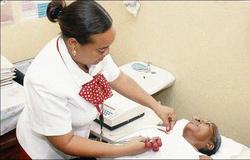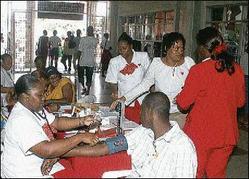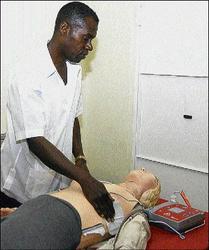Marlon Vickerman, Features Writer

A client being prepared to have the electrocardiogram (ECG) test performed at The Heart Foundation of Jamaica - File Photos
Today we feature another of this year's nominees for the coveted Gleaner Honour Award. We shine the spotlight on the nominee in the category: Voluntary Service.
WHEN THE Heart Foundation of Jamaica was established in 1971, the non-government organisation's main focus was to minimise the incidence of death from heart disease in Jamaica. One way that the agency devised to tackle this task was to procure funds for assisting the operations of the Intensive Care and Cardiac Surgery units at the University Hospital of the West Indies. At that time, this move was a well-appreciated one. However, as time passed, the cruel truth emerged that heart disease was killing more people in Jamaica than anywhere else in the world and that the cost of medical supplies was increasing continually.
Additionally, people realised, locally and internationally, that the most cost effective and beneficial way to combat heart disease was to employ preventive measures. Against this backdrop, the Heart Foundation went back to the drawing board and restructured its aim. This time, the Foundation tailored its focus to stem heart disease-related deaths by introducing programmes of prevention. So far, the journey has been one of tremendous success.
The mobile screening unit

The Heart Foundation of Jamaica spearheads several initiatives aimed at improving the cardiovascular health of the nation, one heartbeat at a time. Among the programmes offered are: the mobile screening unit; screening clinic; supermarket blood pressure/cholesterol/blood sugar screening; nutritional counselling and the school's health promotion programme. The mobile screening unit is somewhat similar to a clinic on wheels. The unit travels the island all year round, making stops in every parish, offering screening to patients at the government health centres, companies, factories and health fairs at subsidised costs. Chances are, you won't miss this health train's visit to your parish, as it is always publicised before the date via loud hailers and the electronic media.
The services offered by the mobile unit are electrocardiograms (ECG) (an electrical recording of the heart used in the investigation of heart disease), blood sugar tests, blood pressure checks, haemoglobin and cholesterol tests and weight checks and diet/weight counselling. Secondly, the Heart Foundation operates a screening clinic at 30 Beechwood Avenue that offers similar services to the mobile unit.
The supermarket blood pressure/ cholesterol/blood sugar screening programme has become popular in the Corporate Area. Banks and other business places have also been included in this move by the Heart Foundation which has been welcomed by the public. This, as the initiative has the potential to and usually detects hypertension in persons who may not usually have frequent medical check-ups.
School's health programme

The Heart Foundation of Jamaica team on location at the Life of Jamaica Shopping Centre in Spanish Town during Heart Month 2006.
Another of the Heart Foundation of Jamaica's initiatives that has become a healthy hit with the public, is the School Health Promotion Programme which is presently in full swing at Shortwood Practicing School, Alpha Primary, Dunrobin Primary, Waterford High School and Excelsior Primary School. The programme seeks to encourage a healthy lifestyle in children and young people. This is done through the setting up of Healthy Heart Clubs at these institutions. The clubs are visited frequently by members of the Heart Foundation who involve the students in sports and health education activities.
In the words of Hildred Stewartson, teacher at the Excelsior Primary School and member of the institution's Healthy Heart Club, the initiative has been one of tremendous success and one that needs to be adopted by more schools.
"Healthy Heart is the most vibrant club in the school, the children are enthused about it and the beautiful thing is that the children are learning to take care of themselves in more positive ways because they are encouraged to eat right, sleep and exercise. The information they receive about caring for their hearts not only stays in the classroom but, they help to educate their parents at home. It's a very good programme and one that I would encourage other schools to get involved in," Mrs. Stewartson said. "It's exciting for the students, they are encouraged in a lot of activities that ensure they have a healthy lifestyle. If children are educated effectively, they will disseminate that information to the wider society. As a result of the Healthy Heart Club, some students desist from buying certain foods because they are now aware of healthy food choices. I believe that once children are on this path to a healthy lifestyle at an early age they will continue to make healthy decisions as adults."
The School Health Promotion Programme is obviously in tune with the Foundation's 'prevention through education' tagline. So, too, are the courses they offer, namely Cardiopulmonary Resuscitation (CPR) Certificate Course, Advanced Cardiac Life Support (ACLS) Course and Paediatric Advanced Cardiac Life Support (PALS) Course. The Heart Foundation has been offering courses in CPR since 1984 with the aim of giving health professionals and laypersons the knowledge and skills they need to recognise and effectively respond to life-threatening cardiopulmonary emer-gencies. The certificate programme is also open to workers in the tourism/hotel industry, water sports personnel, factory personnel and, in essence, any individual who has interest in the programme.
On a slightly different note, the ACLS and PALS courses are only offered to health professionals and other allied health professionals (doctors, registered nurses, and emergency medical technicians) working within the medical areas such as Accidents and Emergency, Intensive Care, Operating Theatre and Ambulance Services.
Whereas the ACLS course provides advanced training in cardiac life support, the PALS course offers advanced training in Paediatric Life Support.
With all that has been said, to this point, it should not be difficult to convince anyone that the Heart Foundation of Jamaica has been keeping the nation's best cardio-interest at heart for a very long time. Whether it is conveniently ensuring that we get the opportunity to have a medical check-up while we shop, or taking to the road in the mobile units and pulling up at a stop near us, ensuring good health and a healthy cardiovascular condition is their business and they take it as seriously as a heart attack. Well, make that preventing one.

Winston, a CPR supervisor, uses a defibrillator on a model at the Heart Foundation headquarters on February 13, 2006.

